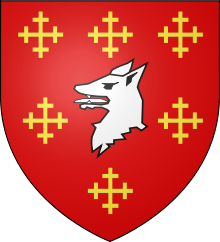Richard d'Avranches, 2nd Earl of Chester
Richard d'Avranches | |
|---|---|
 The coat of arms of Richard d'Avranches, 2nd Earl of Chester[citation needed] | |
| Born | 1094 |
| Died | 25 November 1120 |
| Title | Earl of Chester |
| Term | 1101–1120 |
| Predecessor | Hugh d'Avranches, 1st Earl of Chester |
| Successor | Ranulf le Meschin, 3rd Earl of Chester |
| Spouse | Matilda de Blois |
Richard d'Avranches, 2nd Earl of Chester (1094 – 25 November 1120) was the son of Hugh d'Avranches, 1st Earl of Chester, and his wife, Ermentrude of Clermont.[1]
Early life
[edit]He was seven years old when his father, known as Hugh the Wolf, died. Due to his age, a stewardship would have ruled until he was old enough. He probably became Earl of Chester in 1107. He married Matilda de Blois [2] daughter of Stephen, Count of Blois and Adela of Normandy,[3] daughter of William the Conqueror.
Military career
[edit]At the age of twenty, in 1114, Richard was on a military campaign and was styled the Earl of Chester. Together with King Alexander of Scotland, he led an Anglo-Norman army into Gwynedd as part of a three-pronged campaign organised by Henry I of England against Gwynedd, and Gruffudd ap Cynan. Gruffudd, rather than risk battle, satisfied the King with an oath of homage and a suitable fine. The campaign soon fizzled out, and Richard returned to Chester.
White Ship
[edit]The line of the d'Avranches as Earls of Chester failed when Richard, his wife, and his illegitimate half-brother Ottuel, joined the young William Adelin, heir to the English King Henry aboard the doomed White Ship. The captain, unwisely, chose to race out of the harbour.[4] The ship struck a submerged rocky embankment, capsized and sank.[5] Richard, aged twenty-six,[6] his wife Lucia-Mahaut, and half-brother Ottuel all drowned.[7]
The earldom then passed through his father Hugh's sister Maud to Richard's first cousin Ranulph I, in 1121, because Hugh had no other suitable male heirs.
References
[edit]- ^ Christelow 1996, p. 3.
- ^ Noblewomen, aristocracy and power in the twelfth-century Anglo-Norman realm, 2003, pp. 53-80 (30 pages) https://www.jstor.org/stable/j.ctt155jbk1.9?seq=5.
- ^ LoPrete 2007, p. 389.
- ^ Hanley 2019, p. 43.
- ^ Hanley 2019, pp. 43–44.
- ^ LoPrete 2007, p. 339.
- ^ Aurell 2017, p. 49.
Sources
[edit]- Aurell, Martin (2017). The Lettered Knight: Knowledge and Aristocratic Behaviour in the Twelfth and Thirteenth Centuries. Translated by Khalifa, Jean-Charles; Price, Jeremy. Central European University Press.
- Christelow, Stephanie Mooers (1996). "The Division of Inheritance and the Provision of Non-Inheriting Offspring among the Anglo-Norman Elite". Medieval Prosopography. 17 (2 (Autumn)). Board of Trustees of Western Michigan University through its Medieval Institute Publications: 3–44.
- Hanley, Catherine (2019). Matilda: Empress, Queen, Warrior. Yale University Press.
- LoPrete, Kimberly A. (2007). Adela of Blois: Countess and Lord (c.1067-1137). Four Courts Press.
